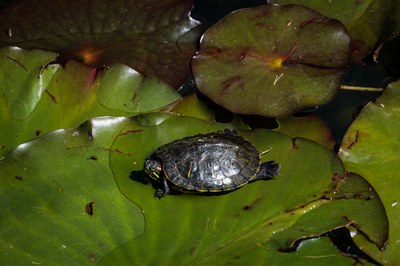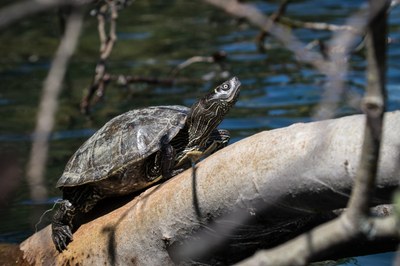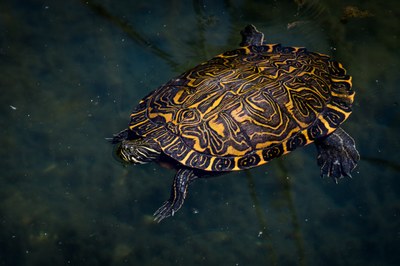North American turtles becoming native in southern Baden, possibly posing a threat to ecosystems
Freiburg, Feb 15, 2023
Non-native turtles are reproducing autonomously in the wild in Germany. Environmental researcher Benno Tietz and biologist Dr. Johannes Penner of the University of Freiburg, along with Dr. Melita Vamberger of the Senckenberg Natural History Collections in Dresden, have now demonstrated for the first time that three species, which originated from North America, are reproducing naturally. Their study of a total of nearly 200 animals living in the wild in lakes in Freiburg and Kehl suggest the turtles have established themselves in a new environment, where they could become a threat to the local ecosystem. “For two species, this is the first evidence of independent reproduction outside of their native distributional range. For the third species, this is the northernmost evidence of reproduction up to now,” says Penner. The results of the study have been published in the academic journal “NeoBiota.”
Turtles released into the wild
World-wide invasive species do a great deal of economic damage. They also contribute to continuing global extinctions of species. Exotic reptiles regularly make it into the wild in Germany. Most often, because they have been released by their owners. Large numbers of North American pond sliders (Trachemys scripta) were imported into the European Union (EU) in the 1980s and 1990s as pets. In 1997, their import into the EU was banned. By 2016, the sale of specimens born here was also declared illegal. Since then, the pet trade has replaced them with other freshwater turtles, such as the river cooter (Pseudemys concinna) and the false map turtle (Graptemys pseudogeographica).
Genetic analyses of specimens of all three species of a range of age classes have now demonstrated that they are reproducing autonomously in local waters. “What’s surprising is that these invasive species have established themselves so far north,” says Benno Tietz. He explains, “In Europe, successful reproduction and self-maintaining populations of Trachemys scripta were only known from the Mediterranean regions and the continental climate zone of Slovenia.” Until recently”, says Tietz, “it had been assumed the studied turtle species are not able to reproduce in Central Europe due to the colder climate. Especially the false map turtle”, adds Tietz, “is actually quite sensitive to cold”.
Consequences for local species unclear
The invasive turtles could become a problem for native species. The European pond turtle (Emys orbicularis), for example, is now only present in Germany in parts of Brandenburg. Penner reports, “In an experimental setup, the European pond turtle showed weight loss and an increased death rate when being kept together with Trachemys scripta.” He says that could be caused by the larger, alien species forcing the smaller local turtles from places where they bask, thus local turtles cannot thermoregulate optimally. Or perhaps the competition led to disadvantages when seeking food.
Beyond that, aquatic turtles could be hosts for viruses and parasites, therefore assisting in spreading diseases. They also could potentially have a negative impact on other parts of the ecosystem, including amphibians, fish, or aquatic plants. On the other hand, the researchers outline in their study, the alien species could provide ecological functions in damaged ecosystems which would otherwise be filled by native species. Vamberger says these questions urgently need to be investigated further. She also demands: “At the same time we need to raise public awareness that people should not release – no matter what kind of species – any animals into the wild in future.”
Factual overview:
- Original publication: Tietz, B., Penner, J., Vamberger, M. (2023): Chelonian challenge: three alien species from North America are moving their reproductive boundaries in Central Europe. In: NeoBiota 82: 1–21.
DOI: https://doi.org/10.3897/neobiota.82.87264 - Dr. Johannes Penner was the scientific coordinator of the research training group “Conservation of Forest Biodiversity in Multiple-Use Landscapes of Central Europe” (ConFoBi) and a lecturer for the Chair of Wildlife Ecology and Management of the University of Freiburg. Currently he is a curator at the NGO “Frogs and Friends” and a guest researcher at Wildlife Ecology. Benno Tietz has completed a master’s degree in Environmental Sciences at the University of Freiburg. His thesis -- finished in the Winter Semester of 2020/2021 -- investigated non-native turtles. Currently he is a researcher at the Freiburg Institute of Applied Animal Ecology. Dr. Melita Vamberger is a researcher at the Senckenberg Natural History Collections in Dresden.
- The study was supported by the Hans Schimenz Fund of the German Society for Herpetology and Terraristics (DGHT) as well as the Academic Society of Freiburg.
Pressphotos for download
Kontakt:
Hochschul- und Wissenschaftskommunikation
Albert-Ludwigs-Universität Freiburg
Tel.: 0761/203-4302
E-Mail: kommunikation@zv.uni-freiburg.de




